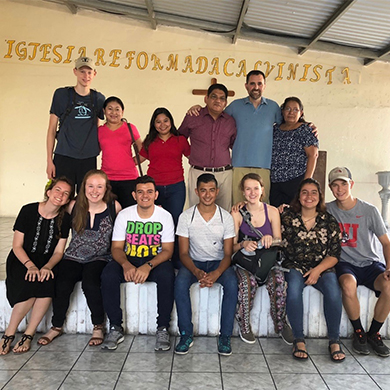

On June 19, a delegation of Brown Memorial youth and leaders departed Baltimore bound for San Salvador. For 10 days we were guests of our sister congregation, Maria Madre de Los Pobres, with whom Brown Memorial has had a relationship spanning more than 30 years.
At Brown Memorial, as in the larger Presbyterian Church (U.S.A.) we do mission in partnership. The focus of our trip was on deepening our long-term relationships with Maria Madre and the neighborhood where Maria Madre is located (La Chacra), with particular focus on youth gaining a greater understanding of the current challenges facing our siblings in the faith and looking for ways to act on what we learn, both in El Salvador and at home.
In La Chacra, the parish continues to be divided geographically, along lines established by three of El Salvador’s powerful gangs. American privilege enabled us to walk freely across those lines during the day, but we heard again and again of the challenges faced by residents who have to navigate these three territories as a part of their daily lives.
Things have improved in the last six months after police action against one of the gangs, but the situation is far from resolved. We learned that these gangs originated in Los Angeles, where crimes against Salvadorans led to the creation of gangs for protection. These gangs were hardened in U.S. prisons and exported through American deportation policies. The gangs have flourished in El Salvador among young people, especially those whose parents have left them to migrate to the United States for work.
The parish continues with many programs to support the development of young people, including a day school, afterschool program (Escuela Abierta), recreation activities, a senior center and a night school which has shifted to Saturday because of the gang violence.
Brown Memorial has provided financial assistance to these programs through the years. Families and individuals at Brown have also supported individual children through the Godparent program. As a part of our trip, we visited with families, sharing gifts and correspondence from Godparents here.
We also visited several anti-violence programs supported through the Mayor’s office. Hernán, a “child of the church,” now a young man, administers the programs through the Mayor’s office. Tierra del Fuego, a dance troupe in La Chacra, provides something for kids to do after school, while teaching them traditional song and dance. This fall, 12 dancers will travel to Panama to perform, and five will go to Argentina. Because of our long-term relationships with Hernán, the group made history as the first delegation from Brown Memorial to make a nighttime excursion in San Salvador.
We celebrated the greater sense of safety that has been achieved in the downtown area, permitting us and Salvadorans of all ages to venture out at night. We also made several excursions to other areas, including Suchitoto where we visited a women’s cooperative that makes artisanal clothing with local indigo; Cinquera, where we visited an ecological park that also serves as a history walk of the Salvadoran Civil War (1980-1992) and heard from a family that fought as guerrillas during the war; and Cabañas, where we visited Radio Victoria (a promoter of human rights and democracy) and the home of Lidia Levia, an anti-mining activist and dear friend of Brown Memorial. There she showed us her farm, including a demonstration of their special compost recipe.
All of our excursions included participants from Madre’s youth group. The hope is that youth-to-youth relationships, over time, will deepen our partnership and lead to unexpected opportunities in the future.